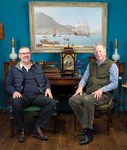
The 5th Money Laundering Directive (known as 5MLD) took effect on January 10 this year and requires auction houses, art galleries and dealerships to conduct stricter due diligence on buyers who purchase from them works of art above a threshold of €10,000.
The regulation requires Art Market Participants (AMPs) – anyone trading in or acting as an intermediary in the trade of works of art that sell for above the threshold – to register and a pay a fee with HMRC.
Part of the requirement of the new law relates to the disclosure of client details – something that has concerned many dealers.
Client concerns
Tom Noon, co-founder of Arcarta, a specialist in art market customer due diligence and anti-fraud technology, hopes to explain how dealers can understand this new regulation in relation to disclosing client details to other dealers.
Noon says: “As the new Money Laundering regulations have taken hold this year many art and antiques businesses find themselves faced with a seemingly unworkable problem: disclosing their clients to another gallery, dealer or auction house.
“While the heart of the regulation concerns itself with a call for transparency to reduce illegitimate activity, it is at odds with two fundamentally important characteristics which define the business of dealing in art: discretion and privacy. These two characteristics are oft sought by legitimate buyers and collectors.”
Under the regulation, Art Market Participants (AMPs) are required to:
• document and author risk assessments for clients,
• compile customer due diligence reports,
• store a range of evidence to be maintained over a five-year period for cumulative or single sales with the same client
Noon adds: “Unfortunately, these requirements extend to include transactions that are concluded with other AMPs so each can satisfy its requirements.
“The unique way in which galleries, dealers and auctioneers have come to operate with one another over time reveals that no art and antiques business exists within a vacuum. In that regard, while many have found it complementary to work with one another, these relationships are turned combative if valuable, commercially sensitive, information has to be given away.
“There are obvious GDPR implications evident in sending sensitive client information over open email. This is raised in the guidance to the new regulations provided by the British Art Market Federation (BAMF). Under regulation 39 ‘Reliance on Third Parties’ it hints at a solution.
“As the word implies, ‘Reliance’ invites one business to ‘rely’ on due diligence undertaken by another, when and where minimum requirements are satisfied.
“However, ‘Reliance’ could be considered a thorny solution to a difficult problem as those who opt to place this ‘Reliance’ on another art business will also be assuming liability for any future issues identified.”
Noon continues: “That said, while implementing ‘Reliance’ is not without its challenges, these are insignificant in contrast to an art world which could be starved of the trust, privacy and discretion it requires in order to function.
“The role of agency keeps the gears of business turning and this ‘Reliance’ justification permits this to continue in a sustainable way.
“To that end, with the right and proper information and process to match, most regulated businesses will not need to disclose clients’ details to another if they follow the ‘Reliance on Third Parties’ guidance.”
For more information visit arcarta.com and its Reliance Program.













